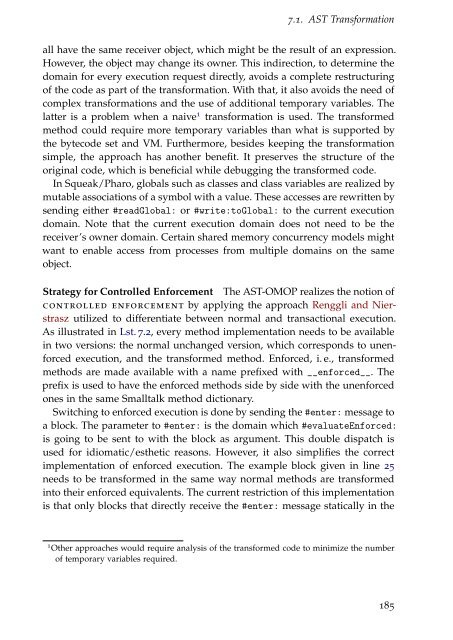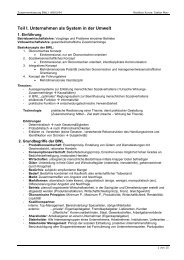here - Stefan-Marr.de
here - Stefan-Marr.de
here - Stefan-Marr.de
Create successful ePaper yourself
Turn your PDF publications into a flip-book with our unique Google optimized e-Paper software.
7.1. AST Transformation<br />
all have the same receiver object, which might be the result of an expression.<br />
However, the object may change its owner. This indirection, to <strong>de</strong>termine the<br />
domain for every execution request directly, avoids a complete restructuring<br />
of the co<strong>de</strong> as part of the transformation. With that, it also avoids the need of<br />
complex transformations and the use of additional temporary variables. The<br />
latter is a problem when a naive 1 transformation is used. The transformed<br />
method could require more temporary variables than what is supported by<br />
the byteco<strong>de</strong> set and VM. Furthermore, besi<strong>de</strong>s keeping the transformation<br />
simple, the approach has another benefit. It preserves the structure of the<br />
original co<strong>de</strong>, which is beneficial while <strong>de</strong>bugging the transformed co<strong>de</strong>.<br />
In Squeak/Pharo, globals such as classes and class variables are realized by<br />
mutable associations of a symbol with a value. These accesses are rewritten by<br />
sending either #readGlobal: or #write:toGlobal: to the current execution<br />
domain. Note that the current execution domain does not need to be the<br />
receiver’s owner domain. Certain shared memory concurrency mo<strong>de</strong>ls might<br />
want to enable access from processes from multiple domains on the same<br />
object.<br />
Strategy for Controlled Enforcement The AST-OMOP realizes the notion of<br />
controlled enforcement by applying the approach Renggli and Nierstrasz<br />
utilized to differentiate between normal and transactional execution.<br />
As illustrated in Lst. 7.2, every method implementation needs to be available<br />
in two versions: the normal unchanged version, which corresponds to unenforced<br />
execution, and the transformed method. Enforced, i. e., transformed<br />
methods are ma<strong>de</strong> available with a name prefixed with __enforced__. The<br />
prefix is used to have the enforced methods si<strong>de</strong> by si<strong>de</strong> with the unenforced<br />
ones in the same Smalltalk method dictionary.<br />
Switching to enforced execution is done by sending the #enter: message to<br />
a block. The parameter to #enter: is the domain which #evaluateEnforced:<br />
is going to be sent to with the block as argument. This double dispatch is<br />
used for idiomatic/esthetic reasons. However, it also simplifies the correct<br />
implementation of enforced execution. The example block given in line 25<br />
needs to be transformed in the same way normal methods are transformed<br />
into their enforced equivalents. The current restriction of this implementation<br />
is that only blocks that directly receive the #enter: message statically in the<br />
1 Other approaches would require analysis of the transformed co<strong>de</strong> to minimize the number<br />
of temporary variables required.<br />
185





